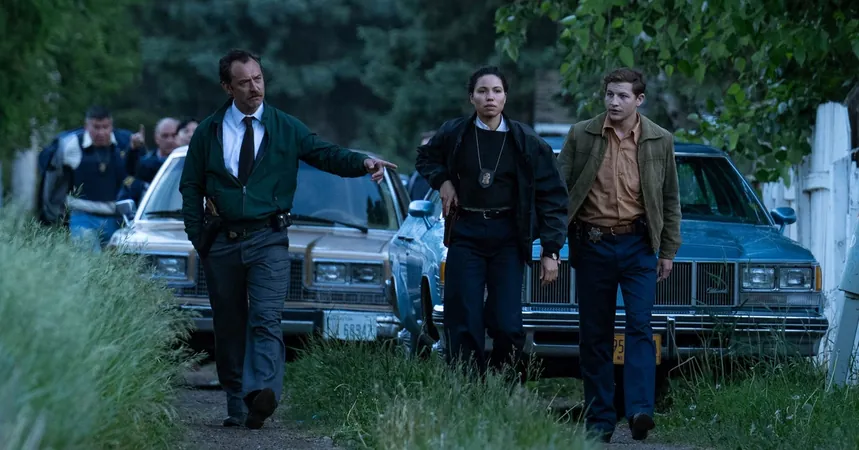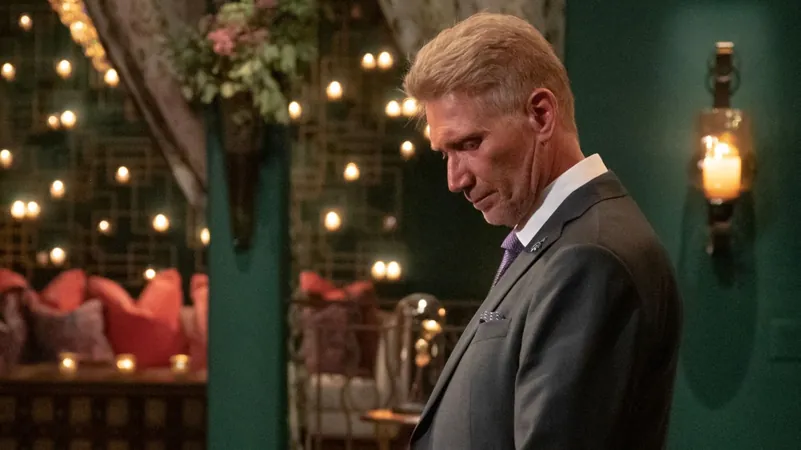
Unveiling "The Order": A Sinister Exploration of American Extremism
2024-12-06
Author: Benjamin
Unveiling "The Order": A Sinister Exploration of American Extremism
In "The Order," the gripping new film directed by Justin Kurzel, viewers are drawn into a chilling narrative that follows Terry Husk, an FBI veteran played by Jude Law. Husk, weary and haunted, obsessively studies a sinister paperback with a blood-red cover, filled with diagrams illustrating plans for targeted killings, bombings, and the ominous image of a gallows looming over the United States Capitol.
A young sheriff, portrayed by Tye Sheridan and newly appointed as Husk's assistant, reveals the grim contents of the book: "There are six steps," he tells Husk. "Recruiting. Fundraising. Armed revolution. Domestic terror. Assassination. And number six is the 'day of the rope.'"
This book is none other than "The Turner Diaries," a controversial 1978 novel authored by William Luther Pierce. The narrative chronicles the violent overthrow of the U.S. government by white supremacist insurgents, showcasing horrifying scenarios of racial extermination. The novel's extremist ideologies have permeated into real-world violence, evidenced by Timothy McVeigh, the Oklahoma City bomber, whose getaway vehicle contained copies of this very book.
In "The Order," Husk's investigation intertwines with the exploits of Bob Mathews, played by Nicholas Hoult, who leads a real-life violent organization known as the Silent Brotherhood. Mathews' gang, responsible for counterfeiting and bank heists, has its roots in the principles laid out in "The Turner Diaries." Though Mathews publicly claimed minimal inspiration from Pierce's work, the connections are undeniable, as both groups shared the same radical nomenclature.
The film shines a light on a critical chapter of American history that has largely faded from public consciousness. The assassination of Jewish talk radio host Alan Berg by two members of the Silent Brotherhood in 1984 catapulted them into the national spotlight, decades later resulting in two Hollywood adaptations. Yet, the broader implications of such extremist movements have become alarmingly relevant as the U.S. grapples with the rise of right-wing militancy.
Despite being developed before the tragic events of the 2017 Unite the Right rally in Charlottesville, the film poignantly reflects ongoing societal tensions. Screenwriters Zach Baylin and Bryan Haas discovered the saga of the Silent Brotherhood while researching American extremism, planning to encapsulate their findings within a traditional crime thriller framework.
Baylin highlights the depth of research that shaped the film, recalling the inspiration gleaned from "The Silent Brotherhood," a meticulous account of Mathews’ radicalization and criminal activities. The narrative poignantly reinterprets the minutiae of that era, depicting not only the tactics of the Silent Brotherhood but also the underlying motivations fueling their heinous actions.
"The Order" carries a unique gravitas reminiscent of classic crime thrillers such as "Heat" and "Serpico." Its tension-imbued action sequences are balanced with thoughtful cinematography, presenting both sweeping landscapes and claustrophobic atmospheres. The characters, portrayed with depth and authenticity by Hoult and Law, reflect the duality of human nature—where ideologues can be charismatic yet profoundly dangerous.
As the film echoes modern threats of domestic extremism, it resonates with contemporary movements, drawing parallels to groups like Atomwaffen Division and the Terrorgram Collective. These organizations have adapted the ideologies of past extremists, creating an alarming resurgence of violent rhetoric and actions that threaten communal safety. The chilling reality is that individuals can now access radical ideas through platforms like Telegram, highlighting the shift in how such ideologies infiltrate modern society.
Kurzel, aware of the heavy themes explored in the film, positions "The Order" as a reflection of today’s political climate. The director noted connections between the film's themes and real-life events, including the January 6 Capitol insurrection. He expressed shock at how relevant "The Turner Diaries" became in contemporary discussions surrounding extremism.
The film's dual narrative of Husk’s relentless pursuit of Mathews culminates in a tense face-off, revealing the shared characteristics of both characters: drive, charisma, and the ability to manipulate those around them. Law remarks on this dynamic, suggesting that within their conflict lies not just ideological opposition but a complex personal struggle—a battle against the very nature of their existence.
Ultimately, "The Order" serves as a haunting reminder of the persistent threat of domestic terrorism, inviting audiences to confront uncomfortable truths about radicalization in modern America. As producer Bryan Haas aptly states, understanding malignant figures from history is crucial to preventing the past from repeating itself. The film's impending release aims not just for critical acclaim but strives to reignite discussions about the roots and ramifications of extremism, urging society to remain vigilant against the forces that seek to divide it.









 Brasil (PT)
Brasil (PT)
 Canada (EN)
Canada (EN)
 Chile (ES)
Chile (ES)
 España (ES)
España (ES)
 France (FR)
France (FR)
 Hong Kong (EN)
Hong Kong (EN)
 Italia (IT)
Italia (IT)
 日本 (JA)
日本 (JA)
 Magyarország (HU)
Magyarország (HU)
 Norge (NO)
Norge (NO)
 Polska (PL)
Polska (PL)
 Schweiz (DE)
Schweiz (DE)
 Singapore (EN)
Singapore (EN)
 Sverige (SV)
Sverige (SV)
 Suomi (FI)
Suomi (FI)
 Türkiye (TR)
Türkiye (TR)